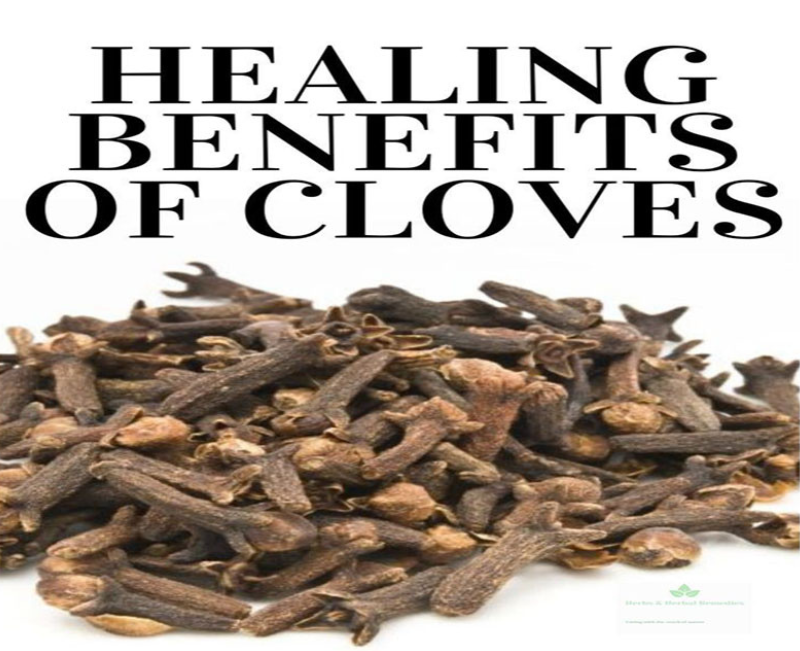Nomenclature
As per Integrated Taxonomic Information System from USA, the scientific name of clove is Syzygium aromaticum, Linn. (foremerly known as Eugenia caryophyllata, Thunb.) It belongs to Myrtaceae family and Syzygium genus.
Other Scientific Names
Caryophyllus aromaticus L.
Eugenia caryophyllus (Spreng.) Bullock & S. Harrison
Names in Traditional System of Medicine
Unani Name: Koronful
Ayurvedic Name: Lavanga, Laung
Description
Plant Identity
The clove tree is a multi-branched perennial plant. It is also a tropical evergreen woody plant in nature that grows about 26 to 50 feet high. The branches contain plenty of leaves that are 3-5 inches long and 2-3 inches wide. [1, 2, 3]
The clove tree flowers when it reaches 5 to 7 years. As a monoecious plant, the clove tree can produce both male and female flowers on the same plant. [4, 5]
At the tips of branchlets, the peduncle emerges and the flowers are born in clusters with white thin petals followed by fruits or clove. Cloves are about one inch long and the tip of the fruits has four notched spots, topped by a round seed.
Habitat of the Plant
The origin of cloves in the Moluccas, which are now part of Indonesia. [6] It is also grown in Madagascar, Tanzania, Srilanka, China, Malaysia, Comoros, Kenya, and south Asian countries. [7,8]
Parts Used in Medicine
Fruits, oil, and seeds
Color
Cloves are light green when raw, red when ripe and reddish pink when dried.
Taste & Scent
Cloves have a strong pungent taste and a pungent aroma. It also has a slightly bitter taste.
Nutrition Facts of Clove
Cloves are full of fiber, vitamins, and minerals. Apart from medicinal use, cloves have extensive uses to add aroma to food. Using whole clove or ground clove can give you various important nutrients.
As per USDA, 1 tsp (2.1 g) of ground cloves contains:
Fiber: 0.712 g
Carb: 1.38 g
Protein: 0.125 g
Calcium: 13.3 mg
Potassium: 21.4 mg
Vitamin K (phylloquinone): 2.98 µg
Calorie: 5.75
Besides it also contains 0.273 g of fat, 5.44 mg of magnesium, 2.18 mg of phosphorus, 5.82 mg of sodium, and 1.26 mg of manganese.
Moreover, it also contains eugenol, cinnamaldehyde, carvacrol, thymol, kaempferol, and saponin.
Bioactivity of Clove
Antioxidant, Antibacterial, Antifungal, Aphrodisiac, Analgesic, Antiseptic, Cardioprotective, Stimulant, Antiseptic, Cardioprotective, Anti-asthmatic, Anti-inflammatory, Antihyperlipidemic, Diuretic, Digestive, Hepatoprotective. [9, 10, 11]
Clove Oil and FDA Approval
It is interesting that U.S. Food and Drug Administration has endorsed the safety of clove buds, clove oil, and some clove components as a dietary supplement. [12, 13]
FDA also approved clove oil and its most valued chemical eugenol as an OTC ingredient. [14]
The approval was given to use them for some specific purposes. They are as follows:
Clove oil: for the protection of skin (astringent).
Eugenol: for pain relief in the case of a fever blister or cold sore, poison ivy, oak, and sumac;
for protection of skin (astringent);
for anesthesia;
for the relief of oral discomfort.
Health Benefits of Clove and Its Usage
Gut’s Care
Reduces Gas and Bloating and Increases Digestion
There is a use of clove in a great deal to reduce gas and bloating both in Unani and Ayurvedic medicine.
After taking a meal, the consumption of clove oil can increase digestive enzymes and thereby decrease gas in the stomach. [15]
Apart from that, you can use clove to get rid of gas in another way. Take several cloves (2-3 cloves) in a glass of water. Then, grind and boil them. After that drink the water when it is lukewarm.
Prevents Ulcers
Clove essential oil helps to prevent ulcers by enhancing the production of mucus in the stomach.
A study found proof of clove’s anti-ulcer activity by increasing gastric mucus production. [16]
Another study demonstrated that gastric mucus acts as a protective layer between the stomach lining and digestive acids. [17]
Prevents Food Poisoning
The Research identified that clove essential oil has the capacity to inactivate effectively three common types of bacteria including salmonella that are responsible for food poisoning.
So, clove essential oil is effective to prevent diseases arising out of food poisoning like diarrhea, abdominal pain, cramps, headache, etc.
Dental Care
Destroys Germs in the Mouth
In Unani and Ayurvedic systems of medication, there was a use of clove as a germicidal substance to destroy the germs in the mouth.
Research also found that clove essential oils have microbicide functions such anti-bacterial, antifungal, and antiseptic.
Relieves Toothache and Gum Pain
Clove is effective to strengthen the gums and remove bad breath. The analgesic property of clove is equally effective to relieve toothache and gum pain.
The research found that clove has the ability to halt the growth of two specific types of bacteria that may lead to gum disease.
To get this benefit, you can use cloves in the following ways: [18, 19]
Chewing Whole Clove
It is quite simple. Take some whole cloves in your mouth, moisten and soften them with your saliva. Then crush them with your non-molar teeth until pain-relieving oil comes out. Once you have done this, hold crushed cloves in your aching tooth for about half an hour without spitting them out.
Ground Clove
If you are in severe pain, you may use the ground clove. At first, take some whole clove and then grind them. Add olive oil to the ground clove and mix them well. Then, dip a cotton swab in the solution and apply it to the inflamed region in the mouth.
Ground Clove and Cayenne Pepper
Take some whole cloves and cayenne peppers in equal amounts and then grind them. After that prepare a thick paste by mixing some water. Then take a cotton ball and roll it into the solution to cover the surface thoroughly. Put the cotton ball into the aching tooth or painful part of your gum.
Clove Oil
Take a few drops of clove oil and dilute it with an edible carrier oil like olive oil or coconut oil. Then soak a cotton ball in the solution and apply the same to the sore tooth or sore spot of your gum. In this respect, take care that it does not come in contact with the healthy part of your gum because it may cause a burning sensation.
Prevents Tooth Cavities and Relieves Pain
Clove is also effective to prevent tooth cavities and alleviate the pain thereto.
A 2006 study demonstrated that clove essential oil protects teeth from erosion caused by acidic beverages. And this erosion of teeth leads to dental cavities. [20, 21]
In a study, a group of researchers experimented with the efficacy of 10 herbal products against the organisms responsible for a tooth cavity. Of these products, clove oil was found to be most effective at deterring the organisms causing tooth cavities. [22]
In this respect, mix clove essential oil with carrier oils like olive oil or coconut oil.
Then, take a cotton ball and soak it in the said mixture, and put the same in the cavity. This will relieve you from the pain of the cavity.
Gets Rid of Teeth Stains
Clove is beneficial for the removal of teeth stains. The bleaching agents of clove and its anti-oxidant property are highly effective to whiten teeth. [23]
So, in order to get rid of the stains of teeth and other microbial organisms attached to the teeth, you can brush your teeth with ground cloves or apply the clove essential oils over the teeth.
Removes Bad Breath
Clove removes bad breath instantly. The phenolic compounds present in clove destroy bacteria responsible for bread breath.
If you face this sort of problem, chew some cloves several times a day.
Else, you may also use clove essential oil. Take 1-2 drops of clove essential oil and mix the same with half a glass of water. Then rinse your mouth with this solution twice a day in the morning and at night.
Temporary Uses in Dental Filling
Dentists fill teeth with a mixture of clove essential oil and zinc oxide as a provisional substitute for a root canal. [24]
Clove for Regular Oral hygiene
To maintain oral hygiene, you need to brush and floss your health regularly. Moreover, if you can use mouthwash sometimes, it can help to prevent gingivitis and gum diseases in your mouth.
In this respect, clove oil-based mouthwash is a good choice.
The rationale is that due to the germicidal and anesthetic properties of clove oil, the said mouthwash will protect you from severe oral diseases. Besides, it will protect your mouth from inflammation and dryness. Apart from that, compared to alcohol-based mouthwashes, it is not unpleasantly rough. On top of that, its distinctive and overwhelming scent acts as a mouth freshener.
Dentists always recommend buying dental products containing clove oil as it is extremely beneficial in freshening breath and maintaining overall oral health.
Other Benefits of the Clove
- Strengthens the Main organs of the body
- Strengthens the power of the brain
- Alleviates heartbeat.
- Refreshes heart
- Prevents gangrene
- Enhances the power of the stomach
- Alleviates the bodily pain
- Enhances the power of the kidney
- Relives nausea and vomiting
- Relives dripping urine
- Enhances the power of Liver
- Relieves pain in the uterus
- Destroys the worms in the stomach
- Reduces blood pressure
- Decreases the extra fat in the blood
- Causes urinary and menstrual flow
- Acts as voice cleaner
- Serves as a mucus thickener and expectorant
- Removes inflammation
- Relives paralysis especially facial paralysis
- Beneficial for skin diseases
- Topical uses alleviate arthritis
- Increases eyesight
- Alleviates earache
Special Functions
- Sexual Power Booster
- Enhancer of the strength of the main organs of the body
- Anti-inflammatory
- Painkiller
- Aromatic
Takeaway
From the above discussion, it is clear that the health benefits of clove beggar description. It is an essential element in most of the Unani and Ayurvedic systems of medicine.
However, although cloves are highly beneficial for health, they may not be suitable for all people. So be aware of the side effects before using clove or clove essential oil.
References
- https://plants.ces.ncsu.edu/plants/syzygium-aromaticum/
- https://pubmed.ncbi.nlm.nih.gov/25182278/
- https://www.nparks.gov.sg/florafaunaweb/flora/3/1/3154
- https://www.nparks.gov.sg/florafaunaweb/flora/3/1/3154
- https://plants.ces.ncsu.edu/plants/syzygium-aromaticum/
- https://www.britannica.com/plant/clove
- https://www.worldatlas.com/articles/the-world-s-top-clove-producing-countries.html
- https://en.wikipedia.org/wiki/Clove
- https://ijcrt.org/papers/IJCRT2008290.pdf
- https://pubmed.ncbi.nlm.nih.gov/25182278/
- https://pubmed.ncbi.nlm.nih.gov/28407719/
- https://www.ncbi.nlm.nih.gov/pmc/articles/PMC8036487/#B63-molecules-26-01880
- https://pubmed.ncbi.nlm.nih.gov/28959566/
- https://www.fda.gov/media/75750/download
- https://www.medicalnewstoday.com/articles/321504#20-ways-to-get-rid-of-gas-pain
- https://pubmed.ncbi.nlm.nih.gov/21140134/
- https://pubmed.ncbi.nlm.nih.gov/10405521/
- https://carrumdownsdental.com.au/benefits-of-cloves-for-toothaches/
- https://www.healthline.com/health/clove-essential-oil#how-to-use
- https://www.ncbi.nlm.nih.gov/pmc/articles/PMC3432374/
- https://www.mayoclinic.org/diseases-conditions/cavities/symptoms-causes/syc-20352892
- https://www.ncbi.nlm.nih.gov/pmc/articles/PMC5296592/
- https://www.sendhildental.com/dental-health-benefits-of-cloves/
- https://www.easyayurveda.com/2017/12/28/clove-essential-oil/

